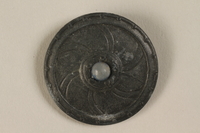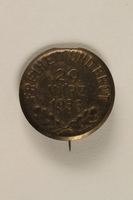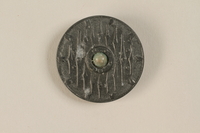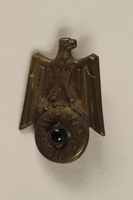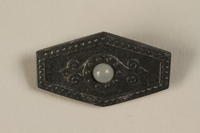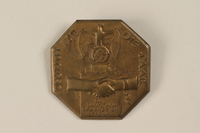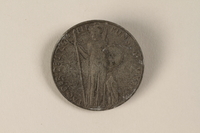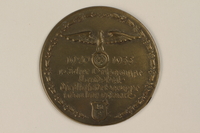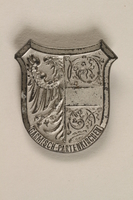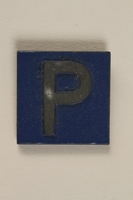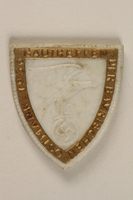Overview
- Brief Narrative
- Wooden badge, (possibly for Nazi German winter relief organization).
- Date
-
approximately 1934-1935
- Credit Line
- United States Holocaust Memorial Museum Collection, Gift of Mark Esterman. These publications were obtained in Germany in 1935 by Benjamin and Sophie Esterman, American citizens who were traveling in Europe, and visited Germany in order to see for themselves and to inform others where Nazism was going. They are donated in the same spirit to the Holocaust Museum by the children of Benjamin and Sophie Esterman and their families; to bear witness and to warn of the cruelty and danger of bigotry, racial prejudice, and hatred.
Physical Details
- Language
- German
- Classification
-
Identifying Artifacts
- Category
-
Badges
- Object Type
-
Badges (lcsh)
- Physical Description
- rectangular, blue with gold paint; recto: image of a Christmas tree and the text, "WHW/1934/35"; verso: adhesive residue; appears to have had a metal pin attached at one time
- Dimensions
- overall: Height: 1.880 inches (4.775 cm) | Width: 1.120 inches (2.845 cm)
- Materials
- overall : wood, paint, adhesive
Rights & Restrictions
- Conditions on Access
- No restrictions on access
- Conditions on Use
- No restrictions on use
Administrative Notes
- Legal Status
- Permanent Collection
- Provenance
- The badge was donated to the United States Holocaust Memorial Museum in 1996 by Mark Esterman.
- Record last modified:
- 2023-08-23 13:41:41
- This page:
- https://collections.ushmm.org/search/catalog/irn11786
Download & Licensing
In-Person Research
- By Appointment
- Request 21 Days in Advance of Visit
- Plan a Research Visit
- Request to See This Object
Contact Us
Also in Mark Esterman collection
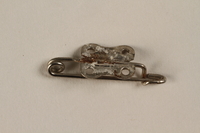
Safety pin from a Nazi badge
Object
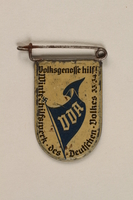
Nazi "Winter Relief" badge
Object
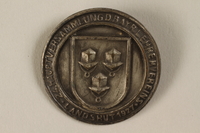
Bavarian Teachers' Union pin
Object
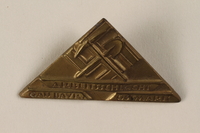
Nazi labor service badge
Object
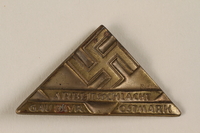
Nazi labor service badge
Object
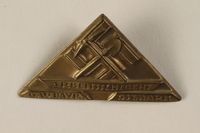
Nazi labor service badge
Object
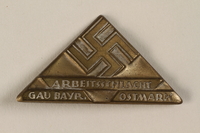
Nazi labor service badge
Object
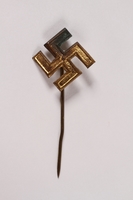
Swastika stick pin
Object
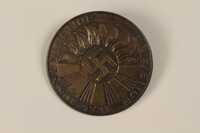
Nazi Party election badge.
Object
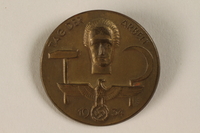
Nazi Party pin for Labor Day 1934
Object
Nazi Party Labor Day (Tag der Arbeit) 1934 pin. Labor Day (also known as May Day) takes place on May 1 to celebrate laborers and the working classes. In April 1933, after the Nazi party took control of the German government, May 1 was appropriated as the “Day of National Work,” with all celebrations organized by the government. On May 2, the Nazi party banned all independent trade-unions, bringing them under state control of the German Labor Front. This style of mass-produced, die stamped pin is often referred to colloquially as a tinnie.
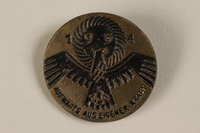
Nazi Party badge
Object

Nazi Party badge
Object
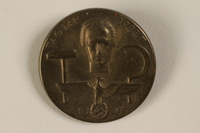
Nazi Party pin for Labor Day 1934
Object
Nazi Party Labor Day (Tag der Arbeit) 1934 pin. Labor Day (also known as May Day) takes place on May 1 to celebrate laborers and the working classes. In April 1933, after the Nazi party took control of the German government, May 1 was appropriated as the “Day of National Work,” with all celebrations organized by the government. On May 2, the Nazi party banned all independent trade-unions, bringing them under state control of the German Labor Front. This style of mass-produced, die stamped pin is often referred to colloquially as a tinnie.
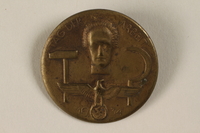
Nazi Party pin for Labor Day 1934
Object
Nazi Party Labor Day (Tag der Arbeit) 1934 pin. Labor Day (also known as May Day) takes place on May 1 to celebrate laborers and the working classes. In April 1933, after the Nazi party took control of the German government, May 1 was appropriated as the “Day of National Work,” with all celebrations organized by the government. On May 2, the Nazi party banned all independent trade-unions, bringing them under state control of the German Labor Front. This style of mass-produced, die stamped pin is often referred to colloquially as a tinnie.
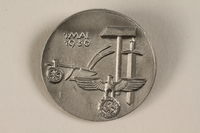
Nazi Party pin for Labor Day 1936
Object
Nazi Party Labor Day (Tag der Arbeit) 1936 pin. Labor Day (also known as May Day) takes place on May 1 to celebrate laborers and the working classes. In April 1933, after the Nazi party took control of the German government, May 1 was appropriated as the “Day of National Work,” with all celebrations organized by the government. On May 2, the Nazi party banned all independent trade-unions, bringing them under state control of the German Labor Front. This style of mass-produced, die-struck metal pin is often referred to colloquially as a tinnie.
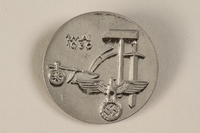
Nazi Party pin for Labor Day 1936
Object
Nazi Party Labor Day (Tag der Arbeit) 1936 pin. Labor Day (also known as May Day) takes place on May 1 to celebrate laborers and the working classes. In April 1933, after the Nazi party took control of the German government, May 1 was appropriated as the “Day of National Work,” with all celebrations organized by the government. On May 2, the Nazi party banned all independent trade-unions, bringing them under state control of the German Labor Front. This style of mass-produced, die-struck metal pin is often referred to colloquially as a tinnie.
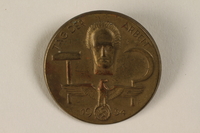
Nazi Party pin for Labor Day 1934
Object
Nazi Party Labor Day (Tag der Arbeit) 1934 pin. Labor Day (also known as May Day) takes place on May 1 to celebrate laborers and the working classes. In April 1933, after the Nazi party took control of the German government, May 1 was appropriated as the “Day of National Work,” with all celebrations organized by the government. On May 2, the Nazi party banned all independent trade-unions, bringing them under state control of the German Labor Front. This style of mass-produced, die stamped pin is often referred to colloquially as a tinnie.

Nazi Party pin for Labor Day 1934
Object
Nazi Party Labor Day (Tag der Arbeit) 1934 pin. Labor Day (also known as May Day) takes place on May 1 to celebrate laborers and the working classes. In April 1933, after the Nazi party took control of the German government, May 1 was appropriated as the “Day of National Work,” with all celebrations organized by the government. On May 2, the Nazi party banned all independent trade-unions, bringing them under state control of the German Labor Front. This style of mass-produced, die stamped pin is often referred to colloquially as a tinnie.
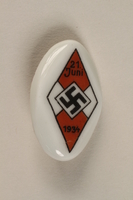
Hitler youth badge
Object
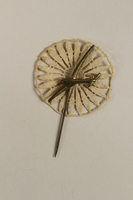
Nazi aviation stickpin
Object
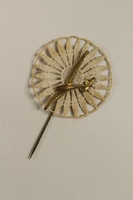
Nazi aviation stickpin
Object
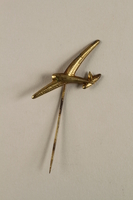
Nazi aviation stickpin
Object
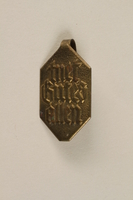
Nazi Party badge
Object
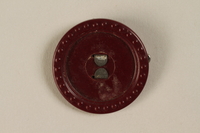
Nazi Party badge
Object
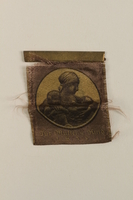
Nazi Mothers' Day badge
Object
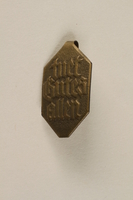
Nazi Party badge
Object

Red Cross badge
Object
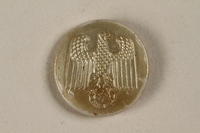
Nazi Party badge
Object
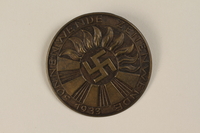
Nazi Party election badge
Object
Booklet
Object
Booklet
Object
Safety pin from a Nazi badge
Object

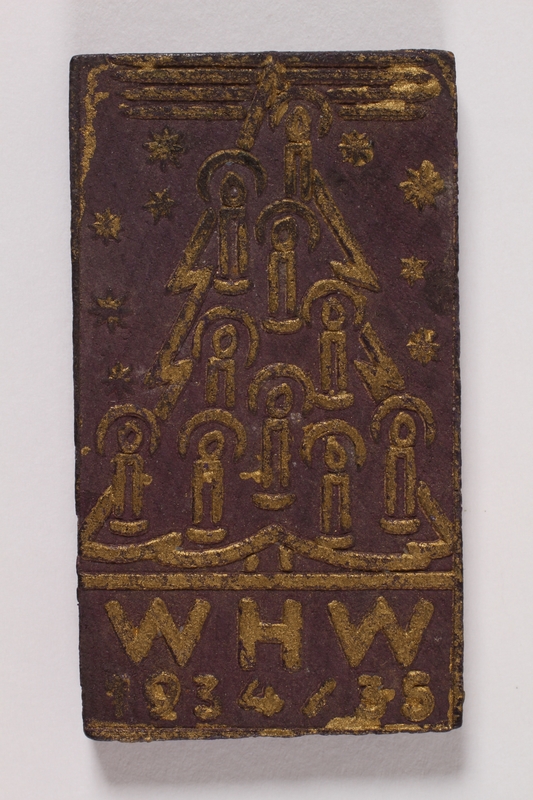
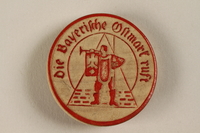
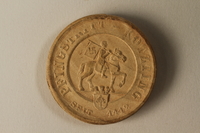
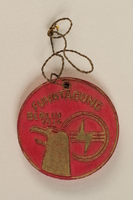
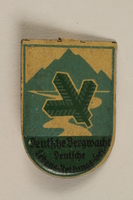
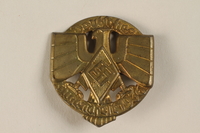
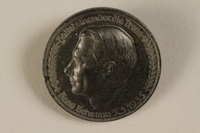
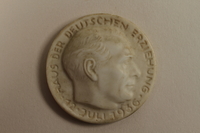
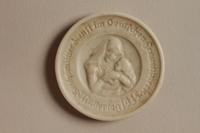
![Hitler Youth [Hitler Jugend/Bund Deutscher Mädel] badge Hitler Youth [Hitler Jugend/Bund Deutscher Mädel] badge](https://www.ushmm.org/media/emu/get?irn=11744&mm_irn=18191&file=secondary)
